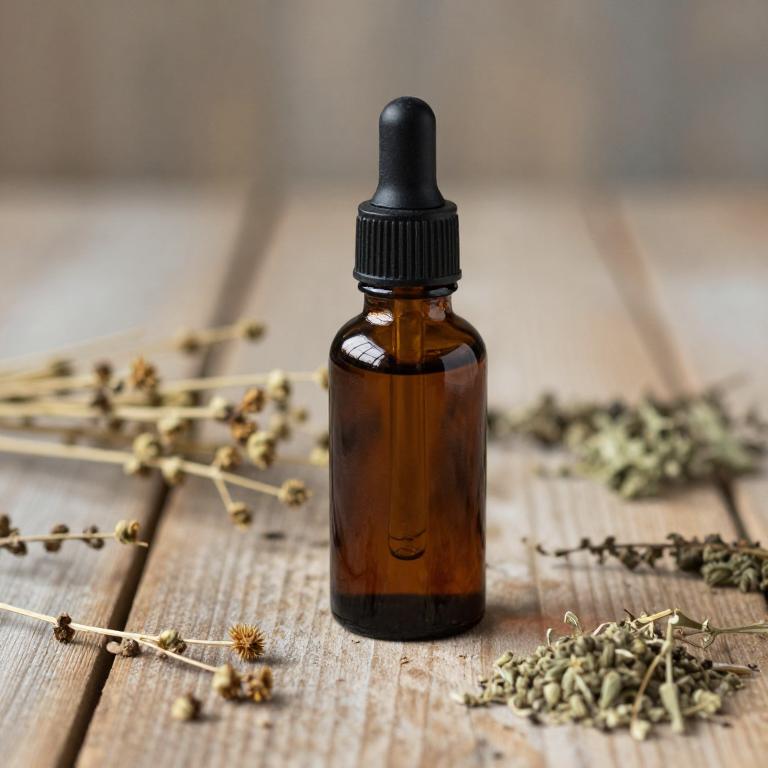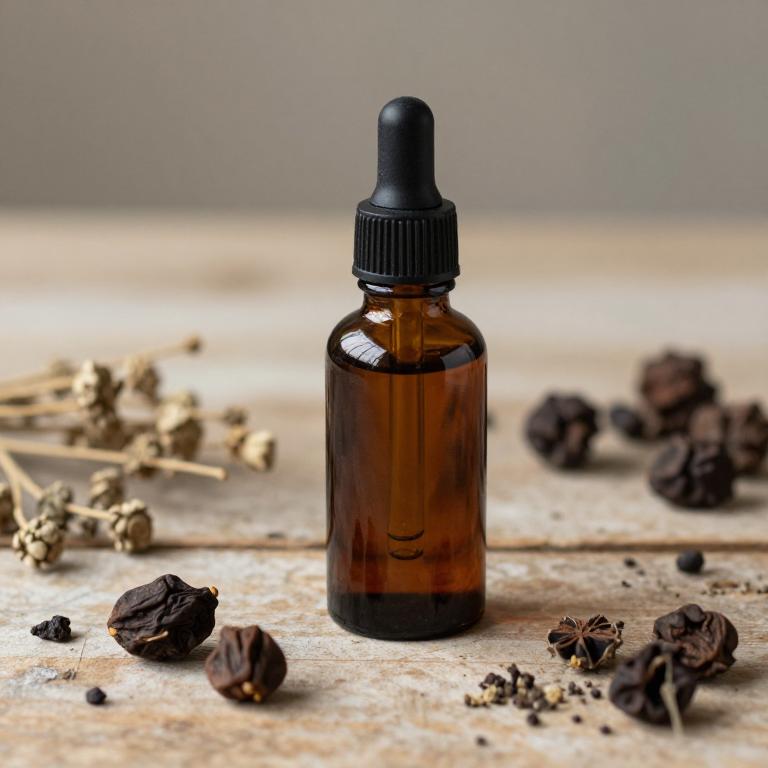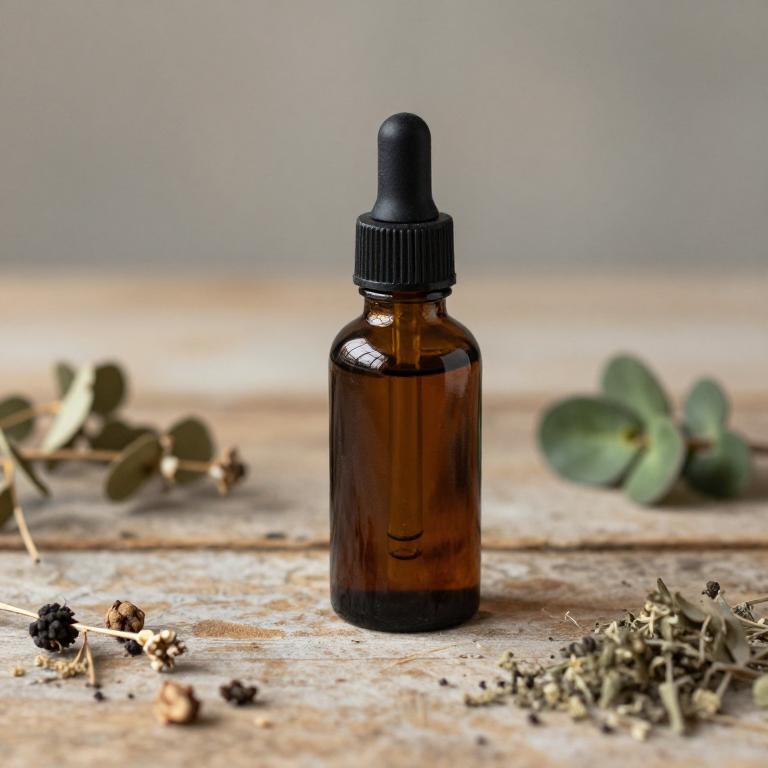10 Best Herbal Tinctures For Stomach Pain

Herbal tinctures have been traditionally used to alleviate stomach pain by harnessing the therapeutic properties of various plants.
Common ingredients include ginger, peppermint, chamomile, and licorice root, each known for their soothing and anti-inflammatory effects on the digestive system. These tinctures are typically prepared by soaking herbs in alcohol or glycerin to extract their active compounds, making them easy to consume and absorb. They are often preferred for their natural composition and minimal side effects compared to synthetic medications.
However, it is important to consult a healthcare professional before use, especially for individuals with chronic conditions or those taking other medications.
Table of Contents
- 1. Ginger (Zingiber officinale)
- 2. Cumin (Cuminum cyminum)
- 3. Thistle (Silybum marianum)
- 4. Fennel (Foeniculum vulgare)
- 5. Black pepper (Piper nigrum)
- 6. Peppermint (Mentha piperita)
- 7. Turmeric (Curcuma longa)
- 8. Blessed thistle (Cnicus benedictus)
- 9. Peperomia plant (Peperomia pellucida)
- 10. Licorice (Glycyrrhiza glabra)
1. Ginger (Zingiber officinale)

Zingiber officinale, commonly known as ginger, has been traditionally used for its digestive benefits, and its herbal tinctures are often employed to alleviate stomach pain.
These tinctures are prepared by soaking fresh or dried ginger in alcohol, allowing the active compounds like gingerol and shogaol to dissolve and potentiate their effects. The anti-inflammatory and carminative properties of ginger tinctures can help reduce nausea, cramping, and bloating associated with digestive discomfort. They are particularly effective for conditions such as indigestion, motion sickness, and even menstrual cramps.
However, it is important to consult a healthcare professional before using ginger tinctures, especially for individuals with gastrointestinal issues or those taking medications.
2. Cumin (Cuminum cyminum)

Cuminum cyminum, commonly known as cumin, has been traditionally used in herbal medicine for its potential benefits in alleviating stomach pain.
Cumin seed tinctures are prepared by soaking the dried seeds in alcohol to extract their active compounds, which include essential oils and flavonoids. These tinctures are believed to aid in digestion by stimulating the production of digestive enzymes and reducing bloating. They may also have mild antispasmodic properties that help ease cramping and discomfort in the gastrointestinal tract.
However, it is important to consult a healthcare professional before using cumin tinctures, especially for individuals with existing medical conditions or those taking medications.
3. Thistle (Silybum marianum)

Silybum marianum, also known as milk thistle, is a herbal remedy commonly used in the form of a tincture to support digestive health.
Its active compound, silymarin, is believed to have hepatoprotective properties that may help reduce inflammation and promote healing in the stomach lining. While primarily known for its liver benefits, some studies suggest that milk thistle tinctures may alleviate symptoms of stomach pain by reducing oxidative stress and improving gastrointestinal function. However, it is important to consult a healthcare professional before using it, especially if you have pre-existing medical conditions or are taking other medications.
Overall, silybum marianum tinctures may offer natural relief for mild stomach discomfort, though their effectiveness can vary among individuals.
4. Fennel (Foeniculum vulgare)

Foeniculum vulgare, commonly known as fennel, is a herb widely used in herbal medicine for its soothing properties, particularly in addressing stomach pain.
Fennel tinctures are prepared by extracting the essential oils from the dried seeds of the plant, which contain compounds like anethol and fenchone that have antispasmodic and carminative effects. These tinctures can help relieve symptoms such as bloating, cramping, and gas by relaxing the muscles of the gastrointestinal tract. They are often recommended for digestive discomfort associated with conditions like irritable bowel syndrome or indigestion.
However, it is important to consult a healthcare professional before use, especially for individuals with known allergies or chronic health conditions.
5. Black pepper (Piper nigrum)

Piper nigrum, commonly known as black pepper, has been traditionally used in herbal medicine for its potential digestive benefits.
When prepared as a tincture, piper nigrum may help alleviate stomach pain by stimulating digestion and reducing bloating. The active compound, piperine, is believed to enhance the absorption of other nutrients and may have anti-inflammatory properties that soothe the gastrointestinal tract. However, while some individuals report relief from stomach discomfort using black pepper tinctures, it is important to consult a healthcare professional before use, especially for those with existing digestive conditions or who are taking medications.
As with any herbal remedy, the effectiveness of piper nigrum tinctures can vary depending on the individual and the specific formulation.
6. Peppermint (Mentha piperita)

Mentha piperita, commonly known as peppermint, is a popular herb used in the preparation of tinctures to alleviate stomach pain.
These tinctures are made by soaking crushed peppermint leaves in alcohol to extract their active compounds, such as menthol and other essential oils. Peppermint tinctures are believed to work by relaxing the muscles of the digestive tract, reducing spasms and easing discomfort. They are often used for conditions like irritable bowel syndrome (IBS) and indigestion due to their soothing effects.
However, it is important to consult a healthcare professional before use, especially for individuals with certain medical conditions or those taking other medications.
7. Turmeric (Curcuma longa)

Curcuma longa, commonly known as turmeric, has been traditionally used for its anti-inflammatory and antioxidant properties, making it a popular ingredient in herbal tinctures for stomach pain.
These tinctures are typically prepared by extracting the active compound curcumin from the rhizome of the plant, which is then diluted in alcohol or another suitable solvent. They are often used to alleviate symptoms such as bloating, indigestion, and inflammation in the gastrointestinal tract. The anti-inflammatory effects of curcumin may help reduce irritation and promote healing in the stomach lining.
However, it is important to consult a healthcare professional before using curcuma longa tinctures, especially if you have underlying health conditions or are taking other medications.
8. Blessed thistle (Cnicus benedictus)

Cnicus benedictus, commonly known as St. Benedict's thistle, has been traditionally used in herbal medicine for its potential benefits in alleviating stomach pain.
The herbal tinctures derived from this plant are believed to possess anti-inflammatory and antispasmodic properties that may help reduce discomfort associated with digestive issues. These tinctures are often prepared by soaking the dried plant material in alcohol, allowing the active compounds to be extracted for medicinal use. While some anecdotal evidence supports its effectiveness, more scientific research is needed to fully understand its mechanisms and efficacy.
As with any herbal remedy, it is advisable to consult a healthcare professional before use, especially for individuals with pre-existing health conditions or those taking other medications.
9. Peperomia plant (Peperomia pellucida)

Peperomia pellucida, commonly known as the "ghost plant," has been traditionally used in herbal medicine for its potential soothing effects on the digestive system.
Herbal tinctures made from this plant are believed to help alleviate stomach pain by reducing inflammation and promoting digestion. The active compounds in Peperomia pellucida, such as flavonoids and tannins, may contribute to its anti-inflammatory and antispasmodic properties. While some studies suggest its efficacy in mild digestive discomfort, more clinical research is needed to confirm its therapeutic benefits.
As with any herbal remedy, it is advisable to consult a healthcare professional before use, especially for persistent or severe stomach issues.
10. Licorice (Glycyrrhiza glabra)

Glycyrrhiza glabra, commonly known as licorice root, has been traditionally used for its soothing properties, making it a popular ingredient in herbal tinctures for stomach pain.
The tinctures derived from licorice root contain compounds like glycyrrhizin, which exhibit anti-inflammatory and antispasmodic effects that can help alleviate gastrointestinal discomfort. These tinctures are often used to reduce inflammation in the stomach lining and ease symptoms such as heartburn, indigestion, and ulcers. However, prolonged use of licorice tinctures may lead to side effects like hypertension due to the effects of glycyrrhizin on sodium and potassium levels.
As a result, it is advisable to consult a healthcare professional before using licorice tinctures, especially for long-term or chronic stomach issues.